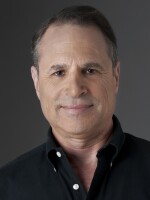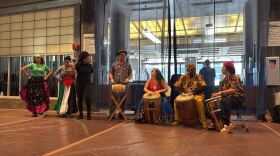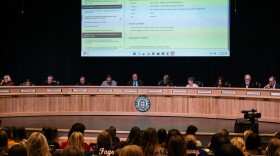About 1,000 people showed up over the weekend at a memorial service for Robert Krentz, 58, an Arizona rancher who was shot and killed along with his dog — presumably by a drug smuggler. Neighbors had worried that a tragedy like this would happen, and they fear for their own safety.
Friends and neighbors gathered for Krentz's funeral and lunch afterward at the historic Gadsden Hotel in Douglas, Ariz. The Krentz family has been ranching in Southeastern Arizona for generations, and folks remembered Krentz as a friendly man who helped whomever he could.
These folks live in ranch houses 5, 10, 20 miles apart. They depend on one another to manage livestock and to communicate vital information. It's always good to get together face to face — though the talk following the murder of one of their own was not about the weather. It was about personal safety.
"We were always concerned," says rancher and veterinarian Gary Thrasher, who spoke on the sidewalk outside the Gadsden Hotel. "I travel out in that area totally by myself in my truck to these ranch calls, and yeah, it makes me a lot more nervous."

The land in the area is a blend of open range and rocky, twisting mountain canyons. A century and a half ago, the Apache warrior Geronimo used the area's trails to elude the U.S. cavalry for decades. Now, the same trails are corridors for drug cartels using illegal immigrants who can't afford to pay for a guide.
"Mafioso says, 'Here, carry this load that will pay for your trip over,' " Trasher says. "Those guys are pretty innocent, but out in front of them is a guide, one usually in front and usually in back. A lot of them are armed."
Authorities speculate that it was one of the guides on his way back who shot Krentz, even though Krentz was armed. Trackers followed the killer's footprints 20 miles south to the Mexican border, where Thrasher says the smugglers terrorize ranchers on the other side.
"The Mexican ranchers right along the border have a worse trouble than we do by a long shot," Thrasher says.
"Oh, I'm tired of it," says rancher John Ladd, who lives with his wife and dogs right on the U.S. side of the border west of Douglas. "It's just every day there's something."
The border fence is visible from his kitchen window. It was built a couple of years ago to keep people out. Ladd says the Border Patrol doesn't keep a constant presence next to the fence, so people climb it using ladders, screwdrivers stuck into the fence mesh, even Mexican ponchos, or serapes, thrown on top of the fence.
Ladd says he has counted 47 groups crossing onto his land in just the past three weeks — more than 300 people.
"From right here," Ladd says. "That's the numbers I'm telling you. I don't count the stuff on the ranch."
U.S. policy since the mid 1990s has been to push illegal crossers out of cities where there are more voters to complain and where crossers can blend into the population — into rural areas where the Border Patrol has days to chase and maybe track them down.
The most common complaint around here, Thrasher says, is the lack of security at the border. "That's where it needs to be stopped — not up in our backyards, not across the ranches. They don't need to be playing Keystone Cops 30 miles north of the border. That's silliness."
And it's increasingly dangerous.
John Ladd says he doesn't carry a gun with him when he's out. It didn't do Rob Krentz any good, he points out. And it invites trouble.
Ladd says there will be more killings if things don't change. He and his fellow ranchers are demanding more resources — radar and unmanned aerial vehicles, and especially more Border Patrol or troops. Ultimately, Ladd says, it comes back to controlling who comes across.
"Number one: There's still got to be a legitimate work program," Ladd adds. "That'll solve part of the problem, that they won't be coming here anymore; there's still gonna be the criminals" — the drug smugglers.
As one rancher, who didn't want to be identified for fear of reprisal from the cartels, put it: "Let everyone who wants a job into the country legally, and shoot the rest."
With the murder of Krentz, the implicit end to that sentence is "before they shoot us."
Copyright 2022 NPR. To see more, visit https://www.npr.org. 9(MDAzMjM2NDYzMDEyMzc1Njk5NjAxNzY3OQ001))







